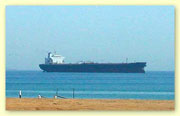July 26
[ 2007-07-26 08:00 ]
 |
| The Suez Canal was
attacked by Anglo-French and Israeli forces in October
1956 |
| 1956: Egypt seizes Suez Canal |
England have
Egypt's president, Colonel Gamal Abdel Nasser, has announced the
nationalisation of the Suez Canal Company to provide funding for the
construction of the Aswan High Dam.
British and French stockholders who own the Suez Canal Company have
reacted with shock to the news.
In a two-and-a-half hour speech delivered to a mass gathering in
Alexandria, President Nasser said the Nationalisation Law had already been
published in the official gazette.
He said all company assets in Egypt had been frozen and stockholders
would be paid the price of their shares according to today's closing
prices on the Paris Stock Exchange.
Vehement criticism
Twelve Egyptians have been appointed members of a special board which
will manage the newly-nationalised company.
The Suez Canal is a key waterway for world trade and an important
source of revenue for Britain.
The Suez Canal Company, which manages the waterway, is legally Egyptian
but, in 1869 was granted a 99 years' concession.
It was not due to revert to
the Egyptian Government until November 16, 1968.
President Nasser, who took control of Egypt following a Coup d'Etat
four years ago, has been implementing a nationalisation programme in the
country, and was vehement in his criticism of the West.
He said 120,000 Egyptians had died building the canal but Egypt was
receiving just a tiny proportion of the company's ?5,000,000 annual
earnings.
President Nasser's decision to nationalise the Suez Canal company comes
following Britain and America's withdrawal of financial assistance towards
the Aswan Dam.
It is understood the USSR agreed last month to provide an unconditional
loan towards the project. |
|
|
|
 |
| The Labour party could
never have expected such a sweeping
victory |
|
1945: Churchill loses general
election | Artificially 1969:
The The
Conservative party has been heavily defeated in the General Election
giving Labour its first ever majority.
Outgoing Prime Minister
Winston Churchill, who tendered his resignation immediately, is succeeded
by leader of the Labour party, Clement Attlee.
The landslide victory comes as a major shock to the Conservatives
following Winston Churchill's hugely successful term as Britain's war-time
coalition leader, during which he mobilised and inspired courage in an
entire nation.
Out of 627 seats Labour increased its seats from
164 to 393, giving the party an independent majority of 159 seats over all
other parties.
The Conservatives and their allies secured 213 seats, the Liberals 10
and other parties 11.
Following the announcement of the results this afternoon, Mr Churchill,
who has held the positions of Prime Minister, First Lord of the Treasury
and Minister of Defence continuously since May 10, 1940, went to
Buckingham Palace to hand in his resignation.
Mr Attlee, 62, was welcomed by the King shortly afterwards and asked to
form a new Government.
Throughout the election campaign Mr Churchill had appealed to the
country to give his new National Government - formed after the dissolution
of the Coalition government in May - a good majority.
But the appeal was rejected by the people of Britain, largely, it is
thought, as revenge for pre-war economic misery suffered by many.
In a statement issued from 10 Downing Street tonight Mr Churchill
expressed his "profound gratitude for the unflinching, unswerving support"
given to him by the people of Britain during the war years.
The outgoing prime minister had broken off meetings with the leaders of
America and Russia in Potsdam on Wednesday (July 25) to return to Britain
for the election results.
It was announced tonight that a proclamation giving Japan an ultimatum
to surrender had been signed by Mr Churchill before his departure.
The document, also signed by American President Harry Truman and
General Chiang Kai-shek of China, called for the unconditional surrender
of all Japanese armed forces or the prospect of "prompt and utter
destruction."
The new prime minister, Mr Attlee, is expected to return to the
three-Power conference in Berlin to resume diplomatic talks
soon. |
|
| Vocabulary:
|
| |
|
revert to :
归还;回复
|
|